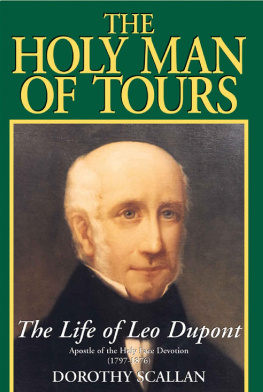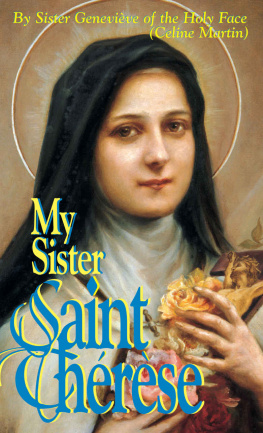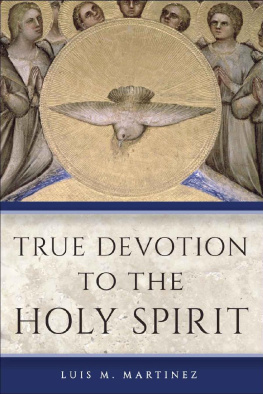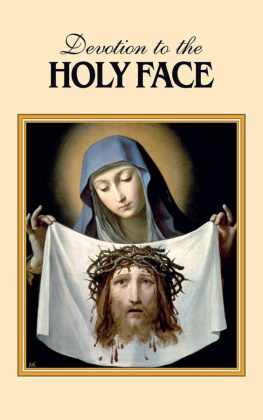The Holy Man of
Tours
The Life of Leo Dupont
1797-1876 Apostle of
the Holy Face Devotion
Dorothy Scallan
Nihil Obstat: | JOHN M. A. FEARNS, S.T.D.
Censor Librorum |
Imprimatur: |  | FRANCIS CARDINAL SPELLMAN
Archbishop of New York
December 13, 1951 |
The Nihil Obstat and Imprimatur are official declarations that a book or pamphlet is free of doctrinal or moral error. No implication is contained therein that those who have granted the Nihil Obstat and Imprimatur agree with the contents, opinions, or statements expressed.
Copyright 1952 by Emeric B. Scallan.
This book was originally published in hardbound in 1952 by The William-Frederick Press, New York, New York under the title of God Demands Reparation: The Life of Leo Dupont , with the author given as Rev. Emeric B. Scallan. (Dorothy Scallan is the sister of Fr. Emeric Scallan.)
Library of Congress Catalog Card No.: 90-70236
ISBN: 0-89555-390-2
TAN Books
Charlotte, North Carolina
www.TANBooks.com
1990
THIS VOLUME IS
DEDICATED
TO THE ILLUSTRIOUS MEMORY
OF THE LATE
B ISHOP C ORNELIUS V AN D E V EN
without whose continuous help, encouragement and solicitude this book would never have seen the light of day. For it was the Bishop's pioneering zeal in the field of the Catholic press that urged him to establish a Diocesan Organ; and, appointing me as editor, launched me on a career of Catholic publishing .
"Rejoice, My Daughter, because the hour approaches when the most beautiful work under the sun will be born.'' Our LordTo Sister Mary of St. Peter(Our Lord refers here to the work of reparation to the Holy Face, which He revealed is destined to be the means of defeating atheistic Communism and restoring peace to the world).

L EO D UPONT
Born in Martinique, January 24, 1797, and died at Tours, France, March 18, 1876 This portrait was made shortly after his death and is based on the recollections of his contemporaries.

W E H EREBY declare that we absolutely and entirely conform to the decree of Urban VIII with respect to the terms of eulogy or veneration applied to the servants of God, Sister Marie Pierre, and Leo Dupont, as well as to the Divine revelations mentioned in the present book; and, moreover, that we by no means anticipate the decisions of the Holy See. "My heart hath said to thee: My face hath sought thee: thy face, O Lord, will I still seek ."
Psalm 26:8
T HOU SHALT HIDE THEM IN THE SECRET OF
T HY F ACE FROM THE DISTURBANCE OF MEN.
P SALMS : 30, v. 21
CONTENTS

I T WAS early spring in Martinique in the year 1805, and through the open windows of a small schoolhouse came the chirping of many birds. A gentle breeze blew sweet scents from peach groves and orange trees, and it was little wonder that the class of small boys, as they tediously wrote on their slates, grew restless hoping that the school-bell would ring out an end to their captivity. Martinique in the springtime was lovely, and the children were longing for the outdoors; but the bell did not ring, and the afternoon dragged on, and with it irksome study.
Suddenly the schoolmaster, Mr. Rochelle, rose and walked to the door. "I shall leave you to yourselves for a while. Continue your lessons until I return," he said as he closed the door behind him.
He was not gone very long, when the youngsters put down their slates and began to playloudly talking, laughing, whistling and enjoying themselves with wild enthusiasm. Their hilarity reached the ears of the schoolmaster at the other end of the building. Mr. Rochelle at once retraced his steps, but the boys, recognizing his hurried pace, were too quick for him and they became silent, so that when the flushed Mr. Rochelle opened the door, no one moved.
"Now, boys, I heard the disorder of this class at the other end of the building. I see you are all suddenly perfectly quiet, but you have not deceived me. I demand to know who were the boys who misbehaved while I was away. The guilty ones will rise and come to the front."
As Mr. Rochelle looked from right to left, he noticed that in the second row, at the fourth desk, one boy promptly rose and, looking straight ahead, marched up to the front. The schoolmaster waited a few moments and then made a second appeal urging the guilty ones to come forward. But no one joined the solitary penitent who, standing alone, peered uncomfortably at the teacher, expecting the worst.
"So, Leo Dupont, you admit that you have been a bad boy. I would expect better things from you, for it seems to me you are big enough to know better. Just how old are you?"
"I am eight years old, master," the boy admitted cheerlessly.
"Eight years old! Really, Leo, your mother will be very grieved to learn of the conduct of her son. Are you not ashamed to admit that you are the only mischievous boy in the whole class? Look at all your schoolmates here, sitting quietly at their desks. They have evidently conducted themselves so well during my absence that now they have nothing to confess. But you, Leo, have been the one black sheep among all these nice, little white lambs...."
The guilty boys began to shuffle restlessly at their desks, their roving eyes betraying the guilt asserting itself in their hearts. But still they clung to their benches, refusing to admit their misbehavior. The large clock on the wall ticked away loud minutes like a clanging doom, warning the youngsters to confess before it was too late. Then the school bell rang. Relief registered on all faces, but it became evident that Mr. Rochelle was not quite ready to dismiss the class.
Pausing for a moment, he looked inquiringly into the faces of the youngsters at their desks and then announced calmly, "Ordinarily, when the bell rings, classes are dismissedthat is, provided there has been no misbehavior. But today it is a different story," he announced, biting his lips.
The room became tense with silence. All eyes were fixed on the threatening schoolmaster, who turned to Leo and said, "My little friend, since you have been so naughty today, I do not believe you deserve to remain in the company of all these good boys. So go for your hat, take your books, and be on your way home. The rest of the children will stay here."
Confused and puzzled, Leo nevertheless did as he was told.
When the door closed behind him, the angry schoolmaster turned flashing eyes at the class, and severely scolded the boys for their dishonesty. "Boys, it is human to make a mistake. It is pardonable to grow restless and noisy once in a while. But to be false, to refuse to admit your guilt, that is something elsethat is something I intend to punish. Little Leo Dupont is much younger than many of you boys, and yet he was the only real man among you. He rose and admitted getting into mischief. From a boy like that I expect great things."
Leo left the schoolhouse, unaware of the praise heaped upon him. He walked out into the sunshine, toward the large gate where he was met by the mulatto servant, Henri, who called daily to drive him home from school in a carriage. "But, Mastah Leo, why is yo all alone by yerself today? Where is all 'em classmates of yours?" inquired Henri, as he took Leo's books and slate, and helped the youngster into the shiny carriage.
Next page















 W E H EREBY declare that we absolutely and entirely conform to the decree of Urban VIII with respect to the terms of eulogy or veneration applied to the servants of God, Sister Marie Pierre, and Leo Dupont, as well as to the Divine revelations mentioned in the present book; and, moreover, that we by no means anticipate the decisions of the Holy See. "My heart hath said to thee: My face hath sought thee: thy face, O Lord, will I still seek ."
W E H EREBY declare that we absolutely and entirely conform to the decree of Urban VIII with respect to the terms of eulogy or veneration applied to the servants of God, Sister Marie Pierre, and Leo Dupont, as well as to the Divine revelations mentioned in the present book; and, moreover, that we by no means anticipate the decisions of the Holy See. "My heart hath said to thee: My face hath sought thee: thy face, O Lord, will I still seek ." 